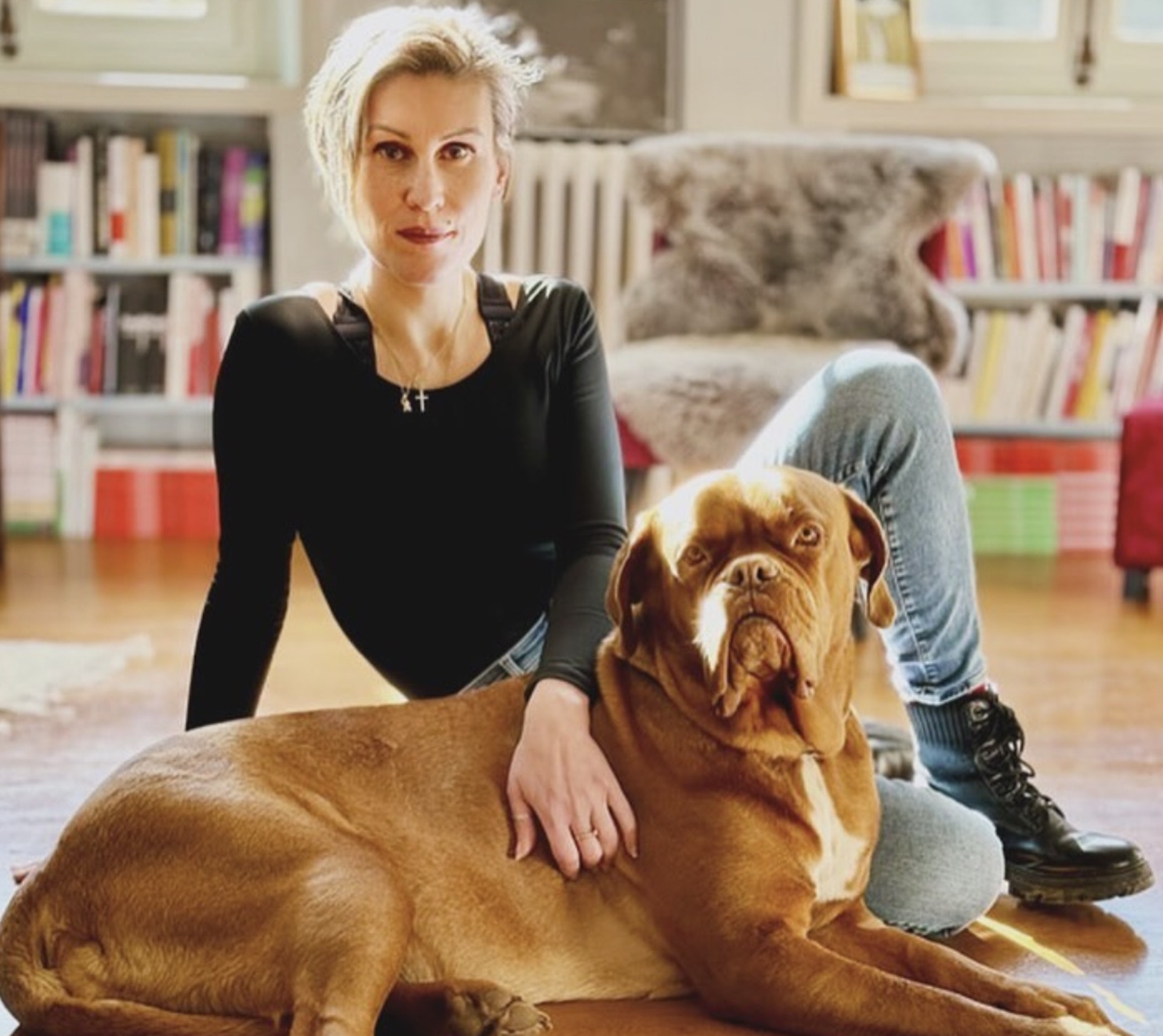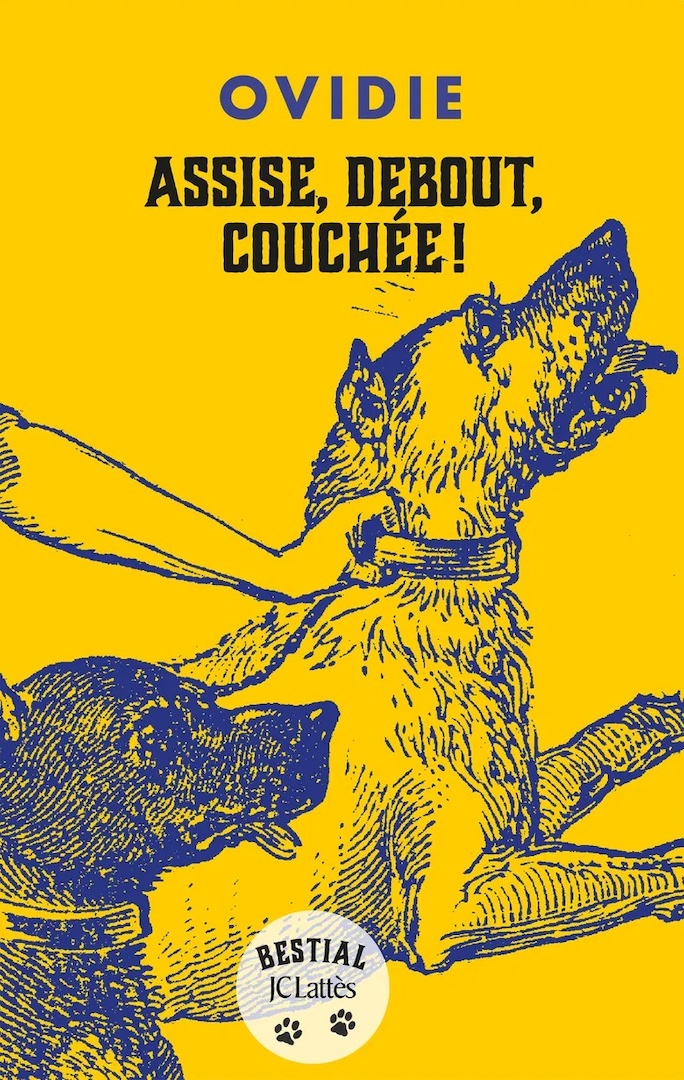I’m not a big dog lover. I was even afraid of it for a good part of my life. My perception of dogs evolved when I found myself, by chance, dog sitting one weekend. For the first time in my life I walked in a public space with a dog, Ribella. I felt unexpected joy. Like 81% of French women, I have been the victim of sexual harassment on the street. As a result, I always cross public spaces with hypervigilance. But with Rebel by my side, no man dared approach me or look at me inappropriately. I felt free wander the streets of Paris.
“This dissuasive presence acts in many different situations, regardless of social category. Dogs are the defenders of the road for those we call ‘dog punkettes’, those who are homeless… This applies in an urban environment, as you have experienced, but also in a rural environment, when we go for a walk in the forest. […] Walking with a dog frees up a part of our brain.” Ovidie explains to me.
Dogs are also victims of patriarchy
The dog (or the dog, a term also used as a sexist insult, well!) he is a shield against male violence, but he can also be a victim of it. In her essay, Ovidie discusses the increase in domestic violence during the Covid pandemic. It coincided with the a explosion of violence against dogs. “We realized that a woman who suffered domestic violence was five times more likely than any other woman to see her dog beaten by her partner”points out.

In his bracing and accessible essay, the author analyzes the way in which women and dogs have been and still are exploited by the patriarchy, for capitalist purposes. She connects the laboratory experiments of which dogs are victims (2 million tortured every year) with those conducted on women in the 19th and 20th centuries.
Like women, dogs are also reduced to the status of decorative objects. We dress them, dress them up and subject them to cosmetic surgery, or mutilations (ears or tails cut) to meet current beauty standards. Not to mention genetic manipulations to make dogs “more beautiful”, regardless of their health.
Ovidie is perplexed by this schizophrenic treatment: “There’s a lot of cognitive dissonance between the videos you post on Insta with adorable pooches and all those left behind, and the thousands of dogs that are produced every year in France on dog farmsintended for animal testing and who will never see a blade of grass.“
Canicides, feminicides, same fight?
A chilling chapter of his essay is dedicated to this canicides – mass killings of dogs considered “strays” – perpetrated in large cities such as Paris, New York or Istanbul, at times when it was a question of clearing unwanted populations from the streets before a world event, to stick to a postcard image.
In 1878, during the Universal Exhibition, the SPA proposed a new invention to eradicate stray dogs in the cities: the gas chambers. They were used in Paris in 1880, by the prefect Louis Andrieux. Know the terrifying rest of the history of the gas chambers. In 1910, in Istanbul, the city decided to deport 35,000 dogs to an island, where most died of dehydration. This episode probably inspired Wes Anderson for his film, “Isle of Dogs”, released in 2018 and which deals with this very topic.
This content is blocked because you have not accepted cookies and other trackers. This content is provided by YouTube.
To view it, you must accept the use made by YouTube with your data which may be used for the following purposes: to allow you to view and share content with social media, to promote the development and improvement of the products of Humanoid and its partners , show you personalized advertisements related to your profile and activity, define a personalized advertising profile, measure the performance of advertisements and content on this site and measure the audience of this site (more information)
Manage my choices
Guess who will stand up to this animal abuse? “From the end of the 19th century, those who became aware, those who opposed these mass massacres, were the feminists. For what ? Because they know they’re next on the list. If they are against the vivisection of dogs it is because they are victims of vivisection Ovidie enlightens us. The first movements in favor of the animal cause were led by figures such as Louise Michel.
This overrepresentation of women in animal causes (they represent between 68% and 80% of activists!), vegetarianism or ecology it only demonstrates the link between the exploitation of animals and that of women, to the delight of the capitalist system. These struggles are demonized or ridiculed, with undertones of sexism.

“In left-wing activist movements more broadly, those who championed the animal cause were considered stupid. It was considered a little too sentimental, not a serious fight. » And if we go back to 1893 and the beginnings of psychiatry, whose misogynistic prejudices we know, the Practical Guide to Mental Illnesses reported that “ Exaggerated affection for an animal is a mental illness », Ovidie tells us.
Dogs, empathy and masculinity
For the author, whose life has been marked by her relationship with dogs, the pain of losing a dog remains a particularly subtle topic. Part of his book is dedicated to the loss of the great canine love of his life, Raziel.
“It raises a lot of questions. How do we decide and at what point have we really made the right choice? Why do we have the power of life and death over the animal? I think I wrote this book especially for this passage. I needed to write to cry. he confides to me.
She regrets it lack of specific psychological support when an animal died, for a long time the only one to speak publicly about this topic was Jean-Pierre Hutin, the creator of the show “30 million friends”, in his book. Mabrouk, a dog’s life.
This content is blocked because you have not accepted cookies and other trackers. This content is provided by YouTube.
To view it, you must accept the use made by YouTube with your data which may be used for the following purposes: to allow you to view and share content with social media, to promote the development and improvement of the products of Humanoid and its partners , show you personalized advertisements related to your profile and activity, define a personalized advertising profile, measure the performance of advertisements and content on this site and measure the audience of this site (more information)
Manage my choices
“ I found him very courageous in addressing these questions, because it’s complicated for a man, even more so in the ’80s, to say publicly ‘I’m depressed because my dog died’. » Ovidie notes that two other authors, Eric Sapin Dufour and François Schuiten, have addressed the topic of canine mourning in 2023. “I see a link with the fact that we are in a phase of deconstruction of masculinity,” the author emphasizes. Can the dog be a tool to develop male empathy and save us from patriarchy? That might be a lot to ask of him!
With Sit, stand, lie downOvidie manages to find a good balance between analysis and personal experience. We learn a lot about how the history of women and dogs are inextricably linked, without falling into overly theoretical work. With her funny and sincere pen, the author brings an addition of soul to his text. Proof of his success, this warm attempt gives rise to a furious desire to have a dog to discover, in turn, the power of this bond. “Well, that was my hidden goal! » jokes Ovidie.
Listen to Apéro des Daronnes, Madmoizelle’s show that aims to break down taboos on parenting.
Source: Madmoizelle
Mary Crossley is an author at “The Fashion Vibes”. She is a seasoned journalist who is dedicated to delivering the latest news to her readers. With a keen sense of what’s important, Mary covers a wide range of topics, from politics to lifestyle and everything in between.




